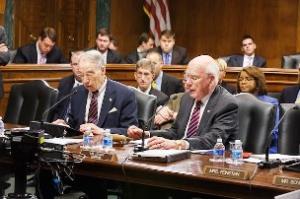We know the end is coming, but marijuana prohibition is going to have to be undone state by state. Here are the ones least likely to jump on the bandwagon.
New Mexico becomes the first state in the nation to end civil asset forfeiture and the abuses it engenders.
A New Orleans man is killed after shooting it out with police, and a South Carolina is killed during a drug raid at his home.
There's action on Capitol Hill, Tennessee passes a CBD cananbis oil bill, a Hawaii dispensary bill moves, Washington sends a medical marijuana overhaul bill to the governor, and more.
A traffic stop for tinted windows turns fatal for a Florida man.
Looks like we've got us a Big City Bad Boys edition this week, with the exception of a pair of crooked Louisiana cops, but that pair is pretty special, too.
President Obama talks ganja in Jamaica, a federal banking official talks shop in Colorado, New Mexico takes a historic step to end civil asset forfeiture, and more.
Rand Paul has a campaign theme he hopes will resonate, Californians will be meeting to plot a legalization initiative next year, a Maryland pot paraphernalia decrim bill heads to the governor, the British Labor Party is hinting at a softening of its hard-line drug policy, and more.
Congress is back and reform bills are picking up new cosponsors, new polls have Iowa dead even on pot legalization and Virginia favoring it, a major medical marijuana conference is coming, Ecuador begins debating a groundbreaking drug reform bill, and more.
Another poll has a national majority for legalization, the DEA head gets skewered over taxpayer-funded sex scandals, the Senate Judiciary Committee eyes civil asset forfeiture reform, and much, much more.
This article was written in collaboration with AlterNet and originally appeared here.
Marijuana prohibition in the US is dying, but it isn't going to vanish in one fell swoop. Even if Congress were to repeal federal pot prohibition, state laws criminalizing the plant and its users would still be in effect -- at least in some states.

Meet the most bud-unfriendly states. (wikimedia.org)
And it's probably a pretty safe bet that Congress isn't going to act until a good number of states, maybe more than half, have already legalized it. That process is already underway and is likely to gather real momentum by the time election day 2016 is over.
Colorado and Washington led the way in 2012, followed by Alaska, Oregon, and Washington, DC, last year. California, where one out of every eight Americans lives, is very likely to go green in 2016 via the initiative process, and so are a handful of other states, including Maine, Massachusetts, and Nevada. Longer shots next year (or even this year, in Ohio's case) are Arizona, Michigan, Missouri, Ohio, and Rhode Islane.
But just as the end of federal alcohol prohibition in 1933 didn't mean the end of state-level prohibition -- Mississippi didn't end it until 1966, you couldn't drink in a bar in Kansas until 1987, and dry counties remain in a number of states -- ending federal marijuana prohibition isn't going to magically make it legal everywhere.
There are two critical factors to consider in assessing how likely a state is to get around to freeing the weed: public opinion and access to non-legislative (read: initiative and referendum) political remedies.
Opinion polls consistently show stronger support for legalization in the West and the Northeast than in the Midwest and the South. But barring access to the initiative process -- which only half the states have -- means that even in states where public opinion strongly favors legalization, residents are going to be beholden to the legislature to get it done. Note that so far, every state that has legalized it has done it through the initiative process. That could change this year, but it seems unlikely at this point.
But even having the initiative process isn't going to help if popular support is lacking. That's why some states make the list even though they have the initiative process. And even having public opinion on your side isn't going to guarantee victory in the legislature, especially if the Republicans are in control.
Here are the nine states least likely to legalize it anytime soon and, after that, a few brief notes on a handful of states:
- Alabama. This Heart of Dixie state still has several dry counties and about a third of the counties in the state are either partially dry or have localities that are dry. Although Democrats hold some local offices, Republicans dominate state elected offices and the state legislature. The state has no initiative process, and the legislature has so far failed to pass even medical marijuana legislation.
- Idaho. This heavily Mormon-influenced state has the initiative process, but so far even campaigners for medical marijuana haven't been able to qualify a measure for the ballot, so it's hard to see how they could get a legalization initiative on the ballot, let alone pass it. An Idaho Politics Weekly poll from February shows what an uphill battle it is. Only 33% of respondents favored legalization, with 64% opposed (and 53% "strongly" opposed). And the conservative Republican legislature is more concerned with fending off sharia law than legalizing pot, although it did manage to pass one of those no-THC, high-CBD cannabis oil bills this eyar.
- Kansas. Another state dominated by Republicans, with no initiative process, and little popular support for legalization, anyway. An October 2014 poll showed only 31% in favor of legalization and, distressingly, an ever larger percentage (33%) saying marijuana possession should be a felony. While voters in Wichita this week approved a municipal initiative decriminalizing pot, the state attorney general has already asked the state Supreme Court to overturn it. Kansas is another one of those states where the legacy of alcohol prohibition lingers, too: Almost all of its counties are either dry or semi-dry. Be glad you're not in Kansas anymore, Dorothy.
- Louisiana. The state has some of the country's harshest marijuana laws, including up to 20 years in prison for repeat possession offenders and up to life in prison for pot possession if the person has a previous felony. Efforts have been afoot in the state legislature for several years to fix those draconian laws, but have so far gone nowhere. An October 2014 poll showed roughly two-thirds supported fixing those laws, but that hasn't yet influenced Baton Rouge. Tellingly, the poll didn't even ask whether respondents supported legalization. And there is no initiative process, anyway. In Louisiana, not sending people to life for marijuana would be progress.
- North Dakota. At the top of that geographical tier of Great Plains states destined to be a bastion of reaction on marijuana legalization, the agricultural state has approved industrial hemp production (in part because North Dakota farmers can see their Canadian counterparts just across the border profiting from it), but is unwilling to move even on medical marijuana, let alone legalization. The legislature this year killed a bill to even study legalizing medical, and an effort last year to put a medical marijuana initiative on the ballot couldn't manage to qualify. An October 2014 poll found that even medical marijuana couldn't get majority support (47%), and the prospects for legalization were even grimmer. Only 24% supported legalization, with 68% opposed.
- Oklahoma. Good luck. The state government is dominated by Republicans and is one of the most conservative in the country. The state has the initiative process and state Sen. Connie Johnson (D-Oklahoma City) is likely to try again to get it on the ballot next year, but even if it were to make the ballot, it would likely get creamed. A poll this month found only 31% for legalization. This is also one of those states where alcohol prohibition still lives on; about a third of the state's counties are completely dry.
- South Carolina. There is no initiative process here, so it will be up to the legislature, which is controlled by Republicans. The legislature passed a no-THC, high-CBD cannabis oil last year, and Republican lawmakers have introduced medical marijuana and decriminalization bills this year, but they have yet to pass. The Palmetto Politics Poll last July barely had majority support for medical marijuana (53%), and didn't even bother to ask about legalization.
- South Dakota. The state has the initiative process, but it also has the dubious distinction of being the only state to twice defeat medical marijuana at the polls. The Republican-controlled legislature has repeatedly refused to act on medical marijuana bills and didn't even consider any marijuana reform bills this year. There is no recent polling on support for legalization, and given the performance of medical marijuana initiatives, even if a legalization initiative were to qualify for the ballot, it would get crushed.
- Utah. The Mormon heartland, another state where Republicans dominate the legislature and the executive branch, and another state where the only legislative concession to pot law reform has been the passage of a no-THC, high-CBD cannabis oil bill. A March poll found 72% of Utahns supported medical marijuana, but that didn't stop the legislature from quickly killing a medical marijuana bill this year. That poll didn't ask about legalization; the last one that did, from 2013, was not encouraging: It had 57% opposed to legalization. Utah has the initiative process, but that won't be much good until Utahns get on board with legalization.
Why Some States Didn't Make the Bottom 9
There are several states that some might have expected to see on this list, but who I think may surprise us and come around more quickly.
In the South and Mid-South, Mississippi and Arkansas would seem like good candidates to be among the last to legalize, but both states have the initiative process and some associated activism around it. They still have to get public opinion on their side, but they can circumvent sclerotic legislatures once they do. And there is hope that demographic trends will turn Georgia, of all the Deep South states, into a place where marijuana can be legalized at the state house before the bitter end.
On the Great Plains, Nebraska is the only state from Texas to Canada that didn't make the bottom nine. It's certainly as solidly conservative as the others and it just hates legalization next door in Colorado, but this is a state that decriminalized weed nearly 40 years ago. Perhaps one of these days, Cornhuskers will wake up and remember that.
In the Intermountain West, Montana and Wyoming share many of the same political and cultural characteristics as Idaho and Utah, but the influence of the Mormon Church isn't nearly as strong. Montana has the initiative process and has used it to approve medical marijuana, only to see that rolled back by Republicans and Christian conservatives. Wyoming also has the initiative process. In both states it will be a struggle between deeply rooted Western individualistic libertarian notions and equally deeply rooted Christian conservativism.
Alright, then. We'll have to check back in 2026 or so and see how prescient this was.
back to top
This article was written in collaboration with AlterNet and originally appeared here.
In a historic move, New Mexico Gov. Susana Martinez (R) today signed into law a bill that will end civil asset forfeiture by law enforcement in the state, a practice widely known as "policing for profit." The measure is House Bill 560.Under civil asset forfeiture, police and prosecutors can seize someone's property without ever charging them with a crime, let alone convicting them. Police can then funnel many of those assets, including cash seizures, back to their own departments, creating a vicious cycle of more profit-driven law enforcement providing more resources to law enforcement for more profit-driven law enforcement.
"This is a good day for the Bill of Rights," said ACLU-NM Executive Director Peter Simonson. "For years police could seize people's cash, cars, and houses without even accusing anyone of a crime. Today, we have ended this unfair practice in New Mexico and replaced it with a model that is just and constitutional."
The practice of asset forfeiture has been coming under increasing scrutiny and criticism in recent years as cases of abuse become more widely known. The Obama administration Justice Department has in the past few months taken steps to address asset forfeiture abuse at the federal level, and asset forfeiture reform bills have been introduced in a number of states this year. The governor of Wyoming vetoed one last month.
New Mexico is the first state where such a bill has passed, and it now has the strongest asset forfeiture protections in the county. The bill passed the legislature unanimously.
Under the new law, civil asset forfeiture will be replaced with criminal forfeiture, forcing authorities to actually convict someone of a crime before taking his property.
"With this law, New Mexico leads the nation in protecting the property rights of innocent Americans," said Paul Gessing, President of the Rio Grande Foundation. "Convicted criminals will still see the fruits of their crime confiscated by the state, but innocent New Mexicans can now rest easy knowing that their property will never be seized by police without proper due process."
"New Mexico has succeeded today in reigning in one of the worst excesses of the drug war," said Emily Kaltenbach, State Director for Drug Policy Alliance's New Mexico office. "Like other drug war programs, civil asset forfeiture is disproportionately used against poor people of color who cannot afford to hire lawyers to get their property back. This law is an important step towards repairing some of the damage the drug war has inflicted upon our society and system of justice."
back to top
A black New Orleans man was killed Monday after a traffic stop escalated into a chase and shootout, and a white South Carolina man was killed in a drug raid on his home Thursday, in the two latest deaths in the US drug war. Desmond Willis, 25, and Phillip Michael Burgess, 28, become the 18th and 19th persons die in US domestic drug law enforcement operations so far this year.
According to The New Orleans Times-Picayune, citing the account provided by Jefferson Parish Sheriff Newell Norman at a Wednesday press conference, deputies initially pulled Willis over for a traffic violation, but smelled marijuana from his open window. (This contradicts an earlier law enforcement statement that he was targeted as part of a drug investigation.) Deputies ordered him to put his hands up and turn off the SUV, but when one deputy reached into the vehicle to grab his arm, Willis sped off.He then crashed his SUV and took off on foot. Norman said Willis fired at deputies and that witnesses inside an office building and a restaurant saw him firing. Deputies returned fire, killing him in the parking lot of New Orleans Seafood and Hamburger.
Detectives recovered a 9 mm pistol near his body, and a .38 caliber pistol and $800 in cash in his pockets. In the SUV, investigators found a half-pound of pot packaged for sale, as well as ammunition, sandwich bags, and a vacuum sealer.
According to Fox Carolina News, citing Spartanburg County Sheriff's Office sources, narcotics officers were serving a drug search warrant Thursday morning in Boiling Springs when Burgess became "belligerent."
The narcs called for backup, and two deputies showed up to assist. The official account said Burgess continued to be belligerent and grabbed a gun from atop the refrigerator, pointing it at deputies. The two deputies then opened fire, killing him.
Because his death was at the hands of law enforcement, it will be investigated by the State Law Enforcement Division (SLED).
No word on if any drugs were found.
back to top
There's action on Capitol Hill, Tennessee passes a CBD cannabis oil bill, a Hawaii dispensary bill moves, Washington sends a medical marijuana overhaul bill to the governor, and more.
NationalLast Wednesday, the DEA recommended that the government triple the amount of marijuana it grows for research. The DEA recommended that the government produce nearly 900 pounds of marijuana for research this year, more than three times the amount the agency had estimated it would need. The increase is because of "unanticipated medical, scientific, research, and industrial needs of the United States," the agency said in a notice published in the Federal Register.
On Monday, came notice of the 9th Annual Clinical Cannabis Conference Next Month in Florida. The medical marijuana advocacy group Patients Out of Time is hosting this premier event. Click on the link for all the details and registration information.
On Tuesday, a federal bill to allow children access to medical marijuana was filed. Reps. Morgan Griffith (R-VA) and Earl Blumenauer (D-OR) Tuesday filed the Compassionate Access Act, which would "allow the states to provide appropriate access to patients needing these legitimate, medical treatments under the supervision of their physician," the congressmen said in a statement. The bill is not yet available on the congressional website.
As of Tuesday, a federal medical marijuana bill had picked up new supporters. The CARERS Act, H.R. 1538, which would end federal interference in states with medical marijuana laws, has picked up new sponsors over the recess. The latest are Reps. Justin Amash (R-MI), Donald Beyer (D-VA), Earl Blumenauer (D-OR), and Joseph Heck (R-NV). The bill now has 12 cosponsors, evenly divided among Democrats and Republicans. Click the link for more bill information.
As of Tuesday, a federal CBD cannabis oil bill had picked up new sponsors. The Charlotte's Web Medical Access Act, H.R. 1635, which would remove cannabidiol (CBD) and CBD-rich marijuana plants from the Controlled Substances Act, has picked up new cosponsors. The latest are Reps. Paul Ryan (R-WI) and Mick Mulvaney (R-SC). The bill now has 20 cosponsors, evenly divided among Democrats and Republicans. Click on the link for more bill information.
9th Annual Clinical Cannabis Conference Next Month in Florida. The medical marijuana advocacy group Patients Out of Time is hosting this premier event. Click on the link for all the details and registration information.
California
Last Thursday, the Los Angeles city attorney said 500 unpermitted dispensaries had been shut down. City Attorney Mike Feuer said Thursday that his office has closed down 500 unpermitted dispensaries since the city voted two years ago to cap their number at about 130. But he conceded that hundreds more still operate.
Colorado
Last Thursday, a bill to allow parolees and probationers use medical marijuana advanced. The House Judiciary Committee unanimously approved a bill that would allow people on probation or parole use medical marijuana. The change wouldn't apply, however, to people whose crimes were related to marijuana. The measure is House Bill 1267.
Florida
On Monday, a CBD cannabis oil regulation bill won a committee vote. The bill, Senate Bill 7066, would expand the number of businesses that could participate from five to 20. It was approved by the Senate Rules Committee, but without addressing complaints from black farmers that they had been shut out of the process. It now goes to the Senate floor.
Hawaii
On Tuesday, the Senate approved a dispensary bill. The bill that would establish a system of medical dispensaries for the state's 13,000 medical marijuana patients. The measure is House Bill 321. The bill now has to go back to the House for reconciliation.
Iowa
On Wednesday, the Senate approved a medical marijuana expansion bill. The Senate voted to approve Senate File 484, which allow the production and distribution of medical marijuana. The bill would allow for up to
a dozen independent dispensaries. It now goes to the House.
Tennessee
Last week, a medical marijuana bill died in the legislature. Both the Senate Health and Welfare Committee and the House Health Committee voted to kill pending medical marijuana bills. Both committees, however, agreed to create summer study committees to look at the legislation.
On Monday, the legislature approved a CBD cannabis oil bill. Both the House and the Senate unanimously approved a bill to allow the use of CBD cannabis oil for the treatment of seizures in children. House Bill 197 now awaits the signatures of Gov. Bill Haslam (R).
Washington
On Tuesday, the legislature approved an overhaul of the medical marijuana system. A bill that seeks to end unregulated medical marijuana dispensary sales and fold medical marijuana into the recreational marijuana system is now headed for the desk of Gov. Jay Inslee (D). Senate Bill 5052 would create a database of patients (voluntary, but patients won't get tax-free medicine unless they sign up), allow patients to possess three times more marijuana than recreational users, and eliminate the current collective garden structure, replacing it with cooperatives limited to four patients.
[For extensive information about the medical marijuana debate, presented in a neutral format, visit MedicalMarijuana.ProCon.org.]
back to top
A Marathon, Florida, man died last week after apparently swallowing a bag or bags of drugs following a traffic stop turned drug bust. Clifford Green, 39, becomes the 20th person to die in US domestic drug law enforcement operations so far this year.
According to The Florida Keys Keynoter, citing a Monroe County Sheriff's Office report, Green was pulled over by Detective Iscandel Perez last Wednesday for having windows too darkly tinted. Perez wrote that Green was "fidgeting about inside the vehicle" before pulling over. [Editor's Note: Apparently, the tinting wasn't so dark.]
Perez ran a computer check that showed Green was on probation for a drug conviction and that his drivers' license had been suspended for failure to pay child support. Green was placed under arrest.
Detective Perez then deployed a drug dog on the exterior of the vehicle and the dog "alerted to the presence of narcotics on the passenger's front side door." Perez and other officers at the scene then searched the car, finding "a beaker and large quantity of blue clear plastic Baggies commonly used to package narcotics inside a paper bag in the back seat of the vehicle. No narcotics were found inside the vehicle at this time."
Deputy Thomas Hill then began transporting Green to the jail in Plantation Key, but within a few miles, Perez wrote, he saw Hill's cruiser stopped with Green "face down on the asphalt" and Hill trying to turn him on his side.
Green was "vomiting, having tremors and irregular breathing," according to Perez's report. The detective added that he saw "what appeared to be a cellophane bag with suspected cocaine inside" Green's mouth.
EMS arrived and took Green to a local hospital, where he was pronounced dead within the hour.
The Florida Division of Law Enforcement is investigating the death.
back to top
Looks like we've got us a Big City Bad Boys edition this week, with the exception of a pair of crooked Louisiana cops, but that pair is pretty special, too. Let's get to it:
In New York City, two Brooklyn narcotics officers were under investigation last Thursday after a video taken during a raid on a bodega appeared to show one of them pocketing $4,000 in cash. Detective Ian Cyrus, 49, from the Brooklyn North Narcotics Squad has been suspended, and Sergeant Fritz Glemaud, 44, has been placed on modified assignment. The investigation continues.In Detroit, two Detroit police officers were arrested last Thursday on charges they robbed drug dealers and stole drugs and money during police raids. Lt. David Hansberry, 34, and Officer Bryan Watson, 46, allegedly identified themselves as police officers to scare their victims into complying with their demands, then stealing their cash, drugs, and personal property. They had been members of the now-disbanded Detroit Police Narcotics Section, but had been suspended since last October. They are charged with conspiracy to possess with intent to distribute narcotics, conspiracy to interfere with commerce by robbery, multiple counts of interference with commerce by robbery and extortion, possession with intent to distribute five or more kilograms of cocaine and two counts of possessing a firearm in furtherance of a crime of violence and drug trafficking crime.
In San Francisco, a San Pablo police officer was arrested last Wednesday after police who were monitoring him saw him make what appeared to be a drug sale. Officer Kenneth White, 32, had a two-year-old child in his back seat when the deal went down. Police suspect he was dealing heroin and cocaine, and he's now being held on suspicion of narcotics violations, weapons violations, and child endangerment.
In Chicago, a Melrose Park Police detective was arrested last Thursday on charges he stole cocaine from the evidence room, plotted to steal drugs from the state lab, and agreed to transport a load of drugs in his unmarked squad car. Detective Gregory Salvi, an 18-year veteran, went down in a sting. He was arrested at a storage facility where he'd gone to pick up a 5-kilogram load of cocaine that he thought he was delivering to another drug dealer. But the dealer was actually a federal informant. He's charged with possessing 5 kilos of coke or more with intent to distribute and is looking at a mandatory minimum 15-year sentence if convicted. He's also charged with using a firearm in furtherance of crime, which is good for another five years.
In Lafayette, Louisiana, a state trooper and a Lafayette Parish sheriff's deputy were arrested over the weekend on charges they conspired with a local businessman to plant drugs in his brother's car and have him arrested. Bryan Knight, the brother of businessman Mark Knight, was arrested in June 2014 after a Mark Knight employee planted drugs in his car and the two cops then showed up to bust him. Evidence on the cell phone of a Mark Knight employee implicated Trooper Corey Jackson and Lafayette Parish deputy Jason Kinch, who was assigned to the narcotics task force. The two cops and the employee were allegedly paid $100,000 for setting up the brother. Both cops are now charged with racketeering in the case.
back to top
President Obama talks ganja in Jamaica, a federal banking official talks shop in Colorado, New Mexico takes a historic step to end civil asset forfeiture, and more.
Marijuana PolicyRastaman Queries Obama on Marijuana Policy. At a town hall event in Kingston, Jamaica, a dreadlocked Rastafarian asked President Obama about legalizing marijuana. "Give thanks! Yes greetings Mr. President," said the man, "Life and blessings on you and your family. My name is Miguel Williams but you can call I and I 'steppa'... That is quite sufficient, ya man." Williams then set out the case for legalization and asked if Obama would champion it. "How did I anticipate this question?" was Obama's joking response. "Well, there is the issue of legalization of marijuana and then there is the issue of decriminalizing or dealing with the incarceration in some cases devastation of communities as a consequence of nonviolent drug offenses," Obama said. "I am a very strong believer that the path that we have taken in the United States in the so-called 'war on drugs' has been so heavy in emphasizing incarceration that it has been counterproductive," he said to some applause. But he didn't address the question of whether the US should legalize, only whether it would. "I do not foresee, any time soon, Congress changing the law at a national basis," he said.
Federal Banking Official Meets With Colorado Pot Shops. Kansas City Federal Reserve President Esther George met with marijuana business owners in Denver Thursday to discuss vexing access to banking issues with proprietors. But she gave no indication that the industry is on the verge of gaining increased access to financial services. Click the link for more details.
Kansas Attorney General Asks State Supreme Court to Undo Wichita Decriminalization Vote. Attorney General Derek Schmidt has asked the high court to strike down the decriminalization ballot measure approved by Wichita voters on Tuesday. In a court filing Thursday, Schmidt argued that the ordinance would conflict with state law, that it would give unlawful direction to police and judges, and that the initiative was not properly filed because it did not contain a "be it ordained" clause required by state law.
Oregon Edibles Could Be Delayed. Oregon pot shops should be open by early next year, but don't expect to find any edibles in them, at least at first. The Oregon Liquor Control Commission has asked the legislature for the okay to delay licensing of edibles manufacturers, citing the complexities around the issue. Edibles may not be available until 2017.
Medical Marijuana
Colorado Bill to Let Parolees, Probationers Use Medical Marijuana Advances. The House Judiciary Committee unanimously approved a bill Thursday that would allow people on probation or parole use to medical marijuana. The change wouldn't apply, however, to people whose crimes were related to marijuana. The measure is House Bill 1267.
Los Angeles City Attorney Says 500 Unpermitted Dispensaries Shut Down. City Attorney Mike Feuer said Thursday that his office has closed down 500 unpermitted dispensaries since the city voted two years ago to cap their number at about 130. But he conceded that hundreds more still operate.
Asset Forfeiture
New Mexico Ends Civil Asset Forfeiture. In a historic move, New Mexico Gov. Susana Martinez (R) today signed into law a bill that will end civil asset forfeiture by law enforcement in the state, a practice widely known as "policing for profit." The measure is House Bill 560. Click on the title link for more details.
Law Enforcement
California Bill Would Allow Immigrant Drug Offenders to Get Treatment, Avoid Deportation. A bill proposed by Assemblywoman Susan Talamantes Eggman (D-Stockton) would let people charged with drug possession and other low-level drug offenses to opt for drug treatment ahead of taking a plea and see their charges dropped if they complete treatment. The bill is designed to block the deportation under federal law of long-time resident immigrants because they have a drug conviction. The bill is Assembly Bill 1351. It is currently before the Assembly Public Safety Committee.
back to top
Rand Paul has a campaign theme he hopes will resonate, Californians will be meeting to plot a legalization initiative next year, a Maryland marijuana paraphernalia decrim bill heads to the governor, the British Labor Party is hinting at a softening of its hard-line drug policy, and more:

Sen. Rand Paul is making drug and criminal justice policy a campaign issue. (senate.gov)
Marijuana in Alaska Will Be a "Regulated" Substance, Not a "Controlled" One Under House Bill. The House Judiciary Committee will remove marijuana from the state's list of controlled substances and move it to the list of regulated ones, committee chair Rep. Gabrielle LeDoux (R-Anchorage) said Friday. The Senate version of the bill, Senate Bill 30, keeps marijuana as a controlled substance, so this isn't a done deal just yet.
California Marijuana Legalization Meetings Set. The Blue Ribbon Commission on Marijuana Policy, led by Lt. Gov. Gavin Newsom (D) will hold a public forum at UCLA on August 21. That will be followed by another forum in Santa Cruz on April 23. Click on the title link for more info and to RSVP. People who want a voice in how legalization is going to look in the Golden State need to show up.
Colorado February Pot Sales Hit Record. Recreational marijuana outlets sold $39.2 million worth of weed in February, beating the previous monthly record of $36.4 million, set the previous month. Much of the increase is being attributed to the opening of more marijuana stores, especially in Aurora, the state's third largest city.
Maryland Legislature Approves Paraphernalia Decriminalization. In what was largely a housekeeping move after the state decriminalized marijuana possession last year, the legislature has approved a bill decriminalizing the tools used to smoke it. The measure is Senate Bill 456. It won final approval in the House Saturday and now goes to the governor's desk.
Missouri Bill to Free Marijuana Lifer Advances. A bill that would free Jeff Mizanskey, who is doing life without parole in state prison for a marijuana offense, has advanced. The measure, HB 978, passed the House Select Committee on the Judiciary last week, but amended it so that Mizanskey is not automatically set free, but instead will be able to seek parole. The bill now awaits a House floor vote.
Washington House Approves Bill to Reconcile Medical, Recreational Marijuana Systems. The House last Friday approved Senate Bill 5052, which has already passed the Senate. But because the House amended it, it will have to go back to the upper chamber for a final vote. The bill would create a patient registry, eliminate the current collective garden structure and replace it with four-person growing cooperatives, and require state regulators to use a merit-based system for granting marijuana business licenses, which should help out collective gardens trying to go recreational. The patient registry would be voluntary, but people would have to sign up if they wanted to avoid having to pay taxes on their medical marijuana purchases.
Wisconsin Lawmaker Files Legalization Bill. Rep. Melissa Sargent (D-Madison) today introduced a bill to legalize marijuana. The bill would create a 25% excise tax on marijuana sales. The bill is not yet available on the legislative website, but she authored a similar bill last year. That bill went nowhere in the Republican-controlled legislature, and this one is expected to meet the same fate.
Medical Marijuana
Florida CBD Cannabis Oil Regulation Bill Wins Committee Vote. The bill, Senate Bill 7066, would expand the number of businesses that could participate from five to 20. It was approved by the Senate Rules Committee, but without addressing complaints from black farmers that they had been shut out of the process. It now goes to the Senate floor.
Hemp
New Mexico Governor Vetoes Industrial Hemp Bill. Gov. Susana Martinez last Friday vetoed a bill that would have allowed research into industrial hemp. The bill, Senate Bill 94, was filed by Sen. Cisco McSorley (D-Albuquerque), a political foe of Martinez, and McSorley said he thought the veto was "political payback."
Drug Policy
Rand Paul Attacks the Drug War. The junior Republican senator from Kentucky who is seeking the GOP presidential nomination used a speech in Las Vegas last Saturday to blast the drug war. "The War on Drugs has created a culture of violence and puts police in an impossible situation," Paul said. "It has fostered tension in our inner cities. There is an undercurrent of unease in our country." He also argued that ongoing racial tensions stem in part from unfairness in the laws and their enforcement. "Criminal justice reform is not a black problem or a white problem," Paul said. "Everyone should be treated the same under the laws of this country regardless of what religion they are, what color their skin is or how poor they are."
International
British Labor Party's Election Manifesto Hints It May Shift Slightly on Drug Policy. Even though Labor has attacked the Liberal Democrats as "soft on drugs" during the run-up to British elections, Labor's own election manifesto hints that it, too, may be softening. The manifesto says that taxpayers pay the cost of "drink and drug misuse" and offers "early years intervention" -- not more arrests and more imprisonment -- as a solution. "We know drug addiction continues to be a major cause of crime," the manifesto says. "We will ensure drug treatment services focus on the root causes of addiction, with proper integration between health, police and local authorities in the commissioning of treatment." Again, the emphasis is on treatment, not punishment. Labor appears unwilling to continue with its "tough on drugs" approach, but also unwilling to forthrightly articulate a more liberal approach.
This article was prepared by StoptheDrugWar.org's lobbying arm, Drug Reform Coordination Network, which also pays the cost of maintaining this web site. DRCNet Foundation takes no positions on candidates for public office, in compliance with section 501(c)(3) of the Internal Revenue Code, and does not pay for reporting that could be interpreted or misinterpreted as doing so.)
back to top
Congress is back and reform bills are picking up new cosponsors, new polls have Iowa dead even on pot legalization and Virginia favoring it, a major medical marijuana conference is coming, Ecuador begins debating a groundbreaking drug reform bill, and more.

The Senate Judiciary Committee will hold a hearing on civil asset forfeiture reform tomorrow. (judiciary.senate.gov)
Federal Marijuana Prohibition Repeal Bill Picks Up New Cosponsor. Rep. Jan Schakowsky (D-IL) is the latest sponsor of HR 1013, the Regulate Marijuana Like Alcohol Act. The bill now has 14 cosponsors -- 13 Democrats and one Republican. Click the link to for more bill information.
Iowa Poll Has State Split on Legalization, Strong Support for Medical. A new Quinnipiac University poll has Iowans split 47% to 47% on legalizing pot, but overwhelmingly in favor of medical marijuana, with 86% saying they support it.
Virginia Poll Has Majority for Legalization.A new Quinnipiac University poll has Virginians backing marijuana legalization, with 54% in favor and only 41% opposed. The poll also had support for medical marijuana above 80%.
Medical Marijuana
Federal Medical Marijuana Bill Picks Up New Cosponsors. The CARERS Act, HR 1538, which would end federal interference in states with medical marijuana laws, has picked up new sponsors over the recess. The latest are Reps. Justin Amash (R-MI), Donald Beyer (D-VA), Earl Blumenauer (D-OR), and Joseph Heck (R-NV). The bill now has 12 cosponsors, evenly divided among Democrats and Republicans. Click the link for more bill information.
Federal CBD Medical Marijuana Bill Picks Up New Cosponsors. The Charlotte's Web Medical Access Act, HR 1635, which would remove cannabidiol (CBD) and CBD-rich marijuana plants from the Controlled Substances Act, has picked up new cosponsors. The latest are Reps. Paul Ryan (R-WI) and Mick Mulvaney (R-SC). The bill now has 20 cosponsors, evenly divided among Democrats and Republicans. Click on the link for more bill information.
9th Annual Clinical Cannabis Conference Next Month in Florida. The medical marijuana advocacy group Patients Out of Time is hosting this premier event. Click on the link for all the details and registration information.
Tennessee Lawmakers Approve CBD Cannabis Oil Bill. Both the House and the Senate unanimously approved a bill to allow the use of CBD cannabis oil for the treatment of seizures in children Monday night. House Bill 197 now awaits the signatures of Gov. Bill Haslam (R).
Hemp
Federal Hemp Bill Picks Up New Cosponsor. The Industrial Hemp Farming Act, HR 525, which would remove hemp from the Controlled Substances Act, has picked up a new cosponsor. The latest is Rep. Ed Perlmutter (D-CO). The bill now has 55 cosponsors -- 36 Democrats and 19 Republicans. Click on the link for more bill information.
Asset Forfeiture
Senate Judiciary Committee Hearing on Civil Asset Forfeiture Reform Tomorrow. The committee will hear from an asset forfeiture abuse victim and an attorney for the Institute for Justice, which has been fighting to rein in such abuses, as well as a representative of the Fraternal Order of Police. Sen. Rand Paul (R-KY) will also address the panel.
Drug Testing
Indiana Welfare Drug Testing Bill Filed. Rep. Terry Goodin (D-Crothersville) today filed an amendment to Senate Bill 465 that would require welfare recipients to undergo screening for drug use and require those identified as high-risk to undergo drug testing.
Sentencing
House Version of Federal Sentencing Reform Bill Picks Up New Cosponsors. The House version of the Smarter Sentencing Act, HR 920, has picked up new cosponsors. The latest are Reps. Steve Cohen (D-TN) and Peter DeFazio (D-OR). The bill now has 26 cosponsors -- 20 Democrats and six Republicans. Click on the link for more bill information.
International
Ecuador Debates Bill That Would Regulate, Not Prohibit, Controlled Substances. Last Thursday, legislators in Quito began debating a new Organic Law on Comprehensive Drug Prevention. The bill, supported by the ruling PAIS Alliance, would "control" more than a hundred substances, including alcohol and tobacco and calls for a Technical Secretariat of Drugs to "regulate and control the activities related to the import, export, cultivation, production, marketing, distribution, transportation, and use" of those substances. Under current Ecuadorian law, cultivation or sale of banned substances garners prison sentences of 12 to 16 years; under the new law, that would be replaced by fines and seizures of the substances. Debate on the bill is expected to happen intermittently over the next few months.
back to top
Another poll has a national majority for legalization, the DEA head gets skewered over taxpayer-funded sex scandals, the Senate Judiciary Committee eyes civil asset forfeiture reform, and much, much more.
Marijuana PolicyNew Pew Poll Has Support for Legalization Nationwide at 53%. Advocates for legalization are winning the battle for public opinion, according to this new poll. Not only does it have a majority for legalization, but the poll also finds that while a fifth of respondents (21%) have switched from opposing to favoring legalization, only 7% have gone from supporting to opposing legalization. The poll also had 78% saying federal marijuana laws should not be enforced in states where pot is legal.
Federal Judge Rejects Motion to Reschedule Marijuana. US District Court Judge Kimberly Mueller declined today to remove marijuana from Schedule I of the Controlled Substances Act. The move came in a marijuana cultivation case where defense attorneys challenged pot's placement on the schedules. Mueller said during a brief hearing that she was initially inclined to grant the motion, but decided "this was not the court and this was not the time." She said it was up to Congress to change the law if it so desires.
Chris Christie Says He Will "Not Permit" Legal Marijuana if Elected. New Jersey's Republican Gov. Chris Christie, a potential 2016 GOP presidential candidate, said Tuesday that if elected he would "crack down" on states that have legalized the weed. "I will crack down and not permit it," he said. "States should not be permitted to sell and profit" from legalization, he added, citing "enormous addiction problems."
Alaska House Passes Bill to Create Marijuana Control Board. The House Tuesday approved legislation to create a five-member marijuana control board to regulate the state's looming legal marijuana industry. The board would craft regulations by November, with the first licenses to be issued in May 2016. The measure is House Bill 123.
District of Columbia City Council Approves Two Marijuana Bills. The first bill, B21-0025, bars employers from testing job applicants for marijuana since it is legal in the city. The second bill, B20-0678, increases the number of plants medical marijuana providers can grow from 95 to 1,000.
Medical Marijuana
Federal Bill to Allow Children Access to Medical Marijuana Filed. Reps. Morgan Griffith (R-VA) and Earl Blumenauer (D-OR) Tuesday filed the Compassionate Access Act, which would "allow the states to provide appropriate access to patients needing these legitimate, medical treatments under the supervision of their physician," the congressmen said in a statement. The bill is not yet available on the congressional website.
Hawaii Senate Approves Dispensary Bill. The Senate Tuesday approved a bill that would establish a system of medical dispensaries for the state's 13,000 medical marijuana patients. The measure is House Bill 321. The bill now has to go back to the House for reconciliation.
Iowa Senate Approves Medical Marijuana Expansion Bill. The Senate voted today to approve Senate File 484, which allows the production and distribution of medical marijuana. The bill would allow for up to a dozen independent dispensaries. It now goes to the House.
Washington Legislature Approves Medical Marijuana Overhaul. A bill that seeks to end unregulated medical marijuana dispensary sales and fold medical marijuana into the recreational marijuana system is now headed for the desk of Gov. Jay Inslee (D). Senate Bill 5052 would create a database of patients (voluntary, but patients won't get tax-free medicine unless they sign up), allow patients to possess three times more marijuana than recreational users, and eliminate the current collective garden structure, replacing it with cooperatives limited to four patients.
Asset Forfeiture
Sparks Fly at Senate Judiciary Committee Asset Forfeiture Hearing. Committee Chair Sen. Charles Grassley (R-IA) had a heated exchange with Fraternal Order of Police President Chuck Canterbury over civil asset forfeiture reform in a hearing today. Canterbury opposed ending civil asset forfeiture because doing so would deprive police of "hundreds of millions" of dollars to fight crime and terror, but Grassley dismissed that argument, saying such laws have created a "perverse incentive" for police to abuse them. Police opposition to reform "dismisses the need for real reform and demonstrates the absurdity of a system of justice in which some in law enforcement appear to value funding their own operations over protecting civil rights," Grassley said. The hearing is part of a broad push this year to reform federal civil asset forfeiture laws.
Virginia Senate Kills Civil Asset Forfeiture Reform. The Senate today set aside efforts to enact civil asset forfeiture reform. The decision came during the legislature's annual reconvene session, when solons meet to consider responding to gubernatorial vetoes and amendments to bills passed during the session that ended last month. The legislature had passed a bill requiring only that police provide an inventory of property seized, and some legislators had hoped to get Gov. Terry McAuliffe (D) to add more substantial reforms, but they gave up on that effort today. Instead, they will leave it for the state crime commission to study.
Law Enforcement
DEA Head Gets Scalded in Hearing Over Agents' Sex Parties. DEA Administrator Michele Leonhart was on the hot seat Tuesday as the House Oversight Committee took aim at revelations of taxpayer-funded sex parties involving DEA agents and prostitutes in Colombia. Members scoffed at her claims that she was unable to fire anyone involved and harshly questioned the agency's (lack of) response to the incidents. Click on the link for juicy details.
Sentencing
California Bill to Refelonize "Date Rape" Drugs Advances. A bill that would give prosecutors the option of charging possession of Rohypnol, ketamine, and GHB as a felony passed the Assembly Public Safety Committee today. Assembly Bill 46 is an attempt to partially roll back last year's voter-approved Proposition 47, which defelonized simple drug possession.
Connecticut Bill Would Dramatically Shrink "Drug Free" Zones. The legislature's Judiciary Committee voted last Friday to amend a bill aimed at reducing the number of drug prisoners in the state by shrinking the area of sentence-enhancing "drug free" zones to just schools and day care centers, eliminating the 1,500-foot zone around the buildings. The vote came as an amendment to Senate Bill 952, part of Gov. Dannel Malloy's (D) "Second Chance Society."
(This article was prepared by StoptheDrugWar.org's lobbying arm, Drug Reform Coordination Network, which also pays the cost of maintaining this web site. DRCNet Foundation takes no positions on candidates for public office, in compliance with section 501(c)(3) of the Internal Revenue Code, and does not pay for reporting that could be interpreted or misinterpreted as doing so.)
back to top










